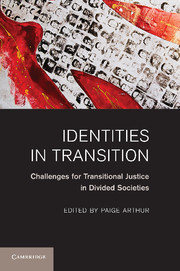Book contents
- Frontmatter
- Contents
- Acknowledgments
- Author Bios
- Introduction: Identities in Transition
- PART I IDENTITY IN TRANSITIONAL JUSTICE MEASURES
- PART II IDENTITIES, TRANSITION, AND TRANSFORMATION
- 7 Canada and the Legacy of the Indian Residential Schools: Transitional Justice for Indigenous People in a Nontransitional Society
- 8 Transitional Justice and the Rights of Minorities and Indigenous Peoples
- 9 “Fear of the Future, Lived through the Past”: Pursuing Transitional Justice in the Wake of Ethnic Conflict
- 10 Transitional Justice, Federalism, and the Accommodation of Minority Nationalism
- 11 History Education Reform, Transitional Justice, and the Transformation of Identities
- Index
- References
11 - History Education Reform, Transitional Justice, and the Transformation of Identities
Published online by Cambridge University Press: 01 March 2011
- Frontmatter
- Contents
- Acknowledgments
- Author Bios
- Introduction: Identities in Transition
- PART I IDENTITY IN TRANSITIONAL JUSTICE MEASURES
- PART II IDENTITIES, TRANSITION, AND TRANSFORMATION
- 7 Canada and the Legacy of the Indian Residential Schools: Transitional Justice for Indigenous People in a Nontransitional Society
- 8 Transitional Justice and the Rights of Minorities and Indigenous Peoples
- 9 “Fear of the Future, Lived through the Past”: Pursuing Transitional Justice in the Wake of Ethnic Conflict
- 10 Transitional Justice, Federalism, and the Accommodation of Minority Nationalism
- 11 History Education Reform, Transitional Justice, and the Transformation of Identities
- Index
- References
Summary
The prospect of a theory of education is a glorious idea, and it matters little if we are not able to realize it at once … we must not look upon the ideas as chimerical, nor decry it as a beautiful dream, notwithstanding the difficulties that stand in the way of its realization.
– Immanuel KantHistory education in common schools, as a part of an officially sanctioned institution, can play an important role in the transformation of historical narratives that are associated with many processes of justice (restorative rather than criminal) and moral repair. These include public apology, broadly understood to include acknowledgment and the presentation of a narrative comprehensible to the victims; recognition of victims and their narratives, hitherto often silenced or distorted through prejudice and stereotyping; public deliberation over the meaning of the past; a message of political and social nonrepetition; and reparations, when schools are founded or reformed to provide new socioeconomic opportunities for formerly marginalized and impoverished groups. Changes in historical narratives – in the ways that groups are portrayed in history textbooks and classrooms – can be a part of creating hope for a future that departs from the past, a distinct dimension of moral repair. They are also, through representation and inclusion, a part of the transformation of identities.
In addition to contributing to these abstract goals, history education can also serve as a specific means to support, continue, and deepen the work of other official transitional justice mechanisms, the ones that are more typically thought of as the pillars of transitional justice, especially truth or truth and reconciliation commissions, reparative measures, and memorialization or commemoration.
- Type
- Chapter
- Information
- Identities in TransitionChallenges for Transitional Justice in Divided Societies, pp. 334 - 368Publisher: Cambridge University PressPrint publication year: 2010
References
- 4
- Cited by



